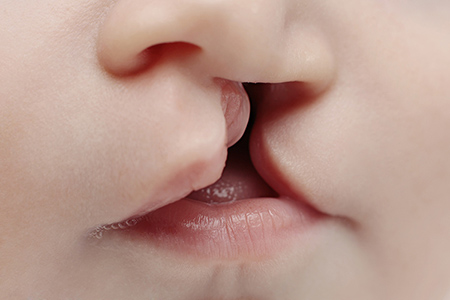
Associate Dean of Research Yang Chai PhD ’91, DDS ’96 has been awarded a five-year, nearly $2 million grant by the National Institute of Dental and Craniofacial Research (NIDCR) for research focused on better understanding the molecular regulatory mechanisms of cleft palate.
It’s the fourth time the grant has been renewed, continuously supporting this research for more than 20 years, which is very significant, Chai said. “It shows how important this work is, and how we have been able to be innovative in our research.”
The research has the potential to make a big impact, because cleft palate is a common congenital birth defect. “Every patient who has this type of cleft has to undergo multiple surgical procedures to correct the birth defects and to live a normal life,” he explained.
Chai’s research has focused on how genetic mutations can affect typical palate development. In particular, Chai has been trying to understand how the palate is formed, the various cell types involved and how the cells communicate throughout palate development.
Scaffolds for better outcomes
Chai will continue this research by focusing on the development of the soft palate — the back part of the palatal shelf that helps to direct air, food and fluid for breathing, eating and drinking. He explained that the soft palate is constantly moving especially when we talk, controlling air through our oral cavity. “When patients have a soft palate cleft, they can suffer multiple problems, including hearing, swallowing and speech deficiencies,” he said. “We want to understand how the soft palate develops and use that information to design some scaffold that will help surgeons to provide a better repair process for these patients.”
His lab is in the process of building scaffolds to direct the muscles into right position to aid the repair process after cleft repair surgery. Eventually, such scaffolds could improve outcomes for patients after surgery.
The palate is a delicate area with lots of tiny connections, and researchers still don’t completely understand the interplay of environment and genetics that can cause a cleft lip or palate. “It’s a complex process, where specific cells have to fuse and then disappear so muscles and bones can grow into place to make the right connections,” Chai said. “It’s not easy; if little things go wrong they can result in birth defects.”
He added that he’s honored that the NIDCR is continuing to support the work to investigate the molecular and cellular mechanisms of cleft palates. “It shows how important this problem is and at the same time, gives us a great sense of responsibility to do something to improve treatment for these patients,” he added.
Research reported in this publication was supported by the National Institute of Dental & Craniofacial Research of the National Institutes of Health under Award Number R01DE012711. The content is solely the responsibility of the authors and does not necessarily represent the official views of the National Institutes of Health.
